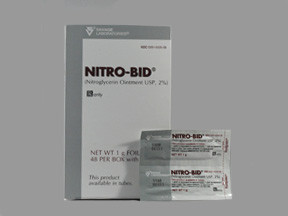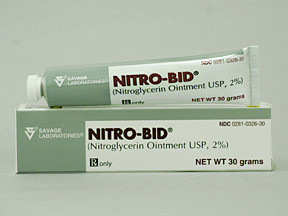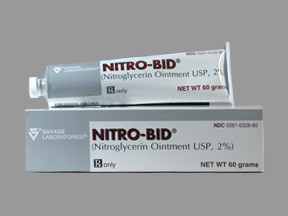NITROGLYCERIN OINTMENT - TRANSDERMAL
PHONETIC PRONUNCIATION: (NYE-troe-GLIS-er-in)
COMMON BRAND NAME(S): Nitro-Bid
GENERIC NAME(S): nitroglycerin
Uses
USES: Nitroglycerin ointment is used to prevent chest pain (angina) in people with a certain heart condition (coronary artery disease). This medication belongs to a class of drugs known as nitrates. Angina occurs when the heart muscle is not getting enough blood. This drug works by relaxing and widening blood vessels so blood can flow more easily to the heart. This medication will not relieve chest pain once it occurs. It is also not intended to be used just before physical activities (such as exercise, sexual activity) to prevent chest pain. Other medications may be needed in these situations. Consult your doctor for more details.
How to use NITROGLYCERIN OINTMENT - TRANSDERMAL
HOW TO USE: Read the Patient Information Leaflet available from your pharmacist. Consult your doctor or pharmacist if you have any questions. Apply this medication as directed by your doctor. Avoid touching the ointment with your fingers. Carefully squeeze out your dose onto a paper dose-measuring applicator. These applicators are supplied with the medication. Place the paper applicator with the ointment side down onto a dry, hairless area of skin, usually on the chest. Do not rub the ointment into the skin. Using the paper, lightly spread the ointment to cover an area of a size directed by your doctor. Tape the paper applicator into place and cover with plastic wrap to avoid staining your clothing. Wash your hands after applying and removing the medication. Remember to use a different area for each application. It is important to apply this medication at the same times each day. Do not change the dosing times unless directed by your doctor. The dosage is based on your medical condition and response to treatment. Remove the medication daily as directed by your doctor. Use this medication regularly to get the most benefit from it. Do not stop using this medication without consulting your doctor. Some conditions may become worse when the drug is suddenly stopped. Your dose may need to be gradually decreased. Although unlikely, when this medication is used for a long time, it may not work as well and may require different dosing. Tell your doctor if this medication stops working well (for example, you have worsening chest pain or it occurs more often).
Side Effects
Precautions
Interactions
Overdose
Images
Reviews
Faq for NITROGLYCERIN OINTMENT - TRANSDERMAL
Nitroglycerin ointment is a medication that is used to relieve and prevent chest pain (angina) caused by coronary artery disease. It works by relaxing and widening the blood vessels, improving blood flow to the heart.
Nitroglycerin ointment is applied directly to the skin. It should be applied to a clean, dry area of the body (usually the chest or upper arm) and rubbing it in until it disappears. Avoid applying near open wounds or irritated skin. Follow the instructions provided by your doctor or pharmacist.
Typically, nitroglycerin ointment is applied two to three times a day, with at least a 10-12 hour interval between each application. Your doctor will determine the specific dosing schedule based on your condition.
Common side effects may include headache, dizziness, lightheadedness, flushing, or a burning sensation at the application site. These side effects are usually temporary. However, if you experience severe side effects such as fainting, rapid heartbeat, or a rash, seek immediate medical attention.
Exercise and physical activity can be beneficial for individuals with angina. However, it is advisable to consult with your doctor before starting or changing your exercise routine. They will provide guidance on appropriate levels of activity while using nitroglycerin ointment.
Certain medications, such as erectile dysfunction drugs like Viagra, Cialis, or Levitra, as well as other nitrate medications, can interact with nitroglycerin and cause a dangerous drop in blood pressure. It is crucial to inform your doctor about all the medications you are taking to avoid potential interactions.
If you accidentally apply too much nitroglycerin ointment or experience severe symptoms such as dizziness, confusion, or difficulty breathing, seek emergency medical assistance immediately.
Nitroglycerin ointment should only be used during pregnancy or breastfeeding if specifically prescribed by a doctor. It is important to discuss the potential risks and benefits with your healthcare provider before using this medication.
Nitroglycerin ointment usually starts working within 15-30 minutes after application. However, the specific onset and duration of action may vary between individuals.
Disclaimer
IMPORTANT: HOW TO USE THIS INFORMATION: This is a summary and does NOT have all possible information about this product. This information does not assure that this product is safe, effective, or appropriate for you. This information is not individual medical advice and does not substitute for the advice of your health care professional. Always ask your health care professional for complete information about this product and your specific health needs.



No Reviews Yet